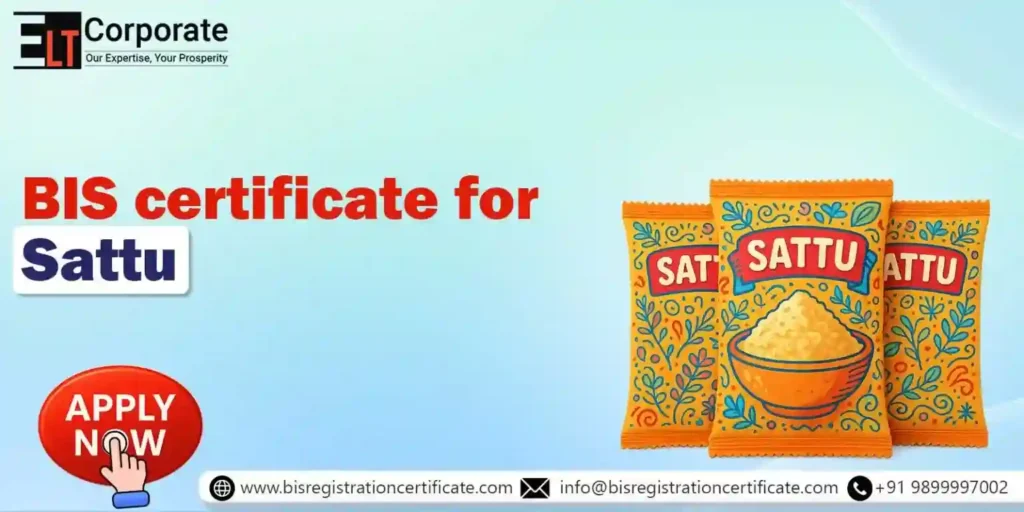Sattu emerges as an Indian superfood crafted from roasted gram, which now sees rising demand in both Indian and international health markets due to its abundant protein, fibre, and energy content. The increasing need for secure top-tier food products drives manufacturers to pursue BIS certification as a means to establish trust while achieving quality standards and enhancing market approval. BIS certification for sattu remains optional, but obtaining it can provide your products with a distinct competitive advantage, particularly within bulk supply networks and international markets.
In this blog. We will read about why BIS certification is important for sattu, the process to obtain it, the required documents, and how it benefits your business.
What is BIS Certification?
The Bureau of Indian Standards (BIS) is the national standards body of India, operating under the Ministry of Consumer Affairs, Food & Public Distribution. BIS certification is a quality assurance mechanism that confirms that a product complies with Indian Standards for safety, performance, and reliability. For products listed under Quality Control Orders (QCOs), BIS certification is mandatory. This includes infant milk substitutes, where consumer health and safety are of utmost concern.
Read More: Introduction To Bureau Of Indian Standards
Why is BIS Certification for Sattu important?
Here are some compelling reasons why BIS Certificate for sattu is important:
- Builds Consumer Trust: BIS mark assures buyers that the Sattu products is hygienic, pure, and free from adulterants.
- Meet Export Requirements: BIS-certified products are more likely to meet import standards of other countries.
- Support Brand Value: It enhances brand image domestically as well as global markets.
- Ensures Compliance: Demonstrates follow-up Indian Standards related to food safety, labelling, and packing.
- Reduce Risk of Rejection: Lower chances of product rejection in inspections, both domestic and overseas.
- Improves Brand’s Reputation: Certification demonstrates commitment to quality, which helps in long-term brand building.
Types Relevant BIS Certification to Sattu
| Type | When Applicable |
|---|---|
| ISI Mark (Domestic) | For Indian manufacturers of Sattu under applicable standards |
| FMCS (Foreign Manufacturers) | For exporters selling Sattu in India |
| Voluntary Certification | For products not under mandatory list but opting for ISI mark to enhance quality image |
Documents Required for BIS Certification for Sattu
For Domestic Manufacturers (ISI Mark Scheme):
- Business registration certificate (e.g., GST, Udyam, etc.)
- FSSAI License (mandatory for food products)
- Factory license or local authority approval
- Product formulation and manufacturing flowchart
- List of machinery and equipment
- In-house quality control details
- Packaging and labelling samples
- Product test report from BIS-recognised lab
- Factory layout and address proof
- Authorised signatory ID and authorisation letter
For International Manufacturers (FMCS – Foreign Manufacturers Certification Scheme):
- Business license of the foreign manufacturing unit
- Product test report from BIS-approved lab in India
- Product specification sheet and formulation details
- Manufacturing process flowchart
- List of machinery, QC equipment, and test facilities
- Factory audit documents
- Nomination of an Authorised Indian Representative (AIR)
- Agreement between AIR and foreign manufacturer
- Label and packaging design samples
- Passport and ID proof of authorised persons
- Undertaking and declarations as per BIS format
Step-by-Step process for BIS certification for sattu
Here’s a simplified step-by-step process for BIS Certificate for sattu:
- Submission of Application: An application for the license will not be accepted unless all compulsory fields are completed and the necessary documents and undertakings are uploaded. The applicant must also pay the application fee, factory inspection fee, and 50% of the minimum marking fee at the time of submission.
- Factory Inspection: On the day of the factory inspection, the manufacturer must have all required information, certifications, and documents ready. The complete technical verification of the documents will be conducted during this visit.
- Sample Collection and Testing: The Inspection Officers must make sure the product sample is packed, sealed, and barcoded in their presence. A Photograph of the barcode will be transferred to the laboratory information management system (LIMS), which will suggest the best laboratory for testing. The inspecting Officers can accept this suggestion or choose another laboratory.
- Grants of License: The applicant must pay the remaining 50% of the minimum marking fee within seven days of the license grant. The ELT Corporate experts will manage the entire BIS Certification process during the grant phase.
- Renewal of Certification: BIS Registration is valid for 2 to 5 years. We help you in renewing it to ensure continued BIS compliance.
Read More: Process for getting BIS for Certification
Risks of Not Getting Certified
- Lower market trust and visibility
- Disqualification in bulk tenders
- Rejection during exports
- Risk of enforcement action it future regulations makes it mandatory
ELT Corporate: Your Compliance Partner
As one of India’s leading regulatory consultancy firms, ELT Corporate offers dedicated support for BIS certificate for Infant Milk Substitute. Our strengths include:
- Experienced Team: Regulatory experts with years of experience in BIS processes
- Pan-India Presence: Strong working relationships with BIS officials and test labs across India
- Quick Turnaround: Fast-track approvals and minimal lead times
- Transparent Communication: Timely updates, guidance, and documentation support
Conclusion
BIS Certification for sattu is a smart step for manufacturers aiming to increase product quality, gain consumer confidence, and access larger domestic and international markets. While it may not be mandatory yet. The certification serves as a mark of reliability and compliance with Indian quality standards. It also prepares your brand for future regulatory changes and boosts competitiveness in government tenders and exports. If you’re serious about scaling your sattu business, BIS certification is an investment worth making.
Is BIS certification mandatory for Sattu in India?
BIS certification is not mandatory for Sattu currently, but it ensures product quality and boosts consumer trust.
What are the benefits of BIS certification for Sattu manufacturers?
It enhances product credibility, supports market access, and complies with future regulatory requirements.
How can a manufacturer apply for BIS certification for Sattu?
The application is submitted online through the BIS portal along with required documents and product samples.








